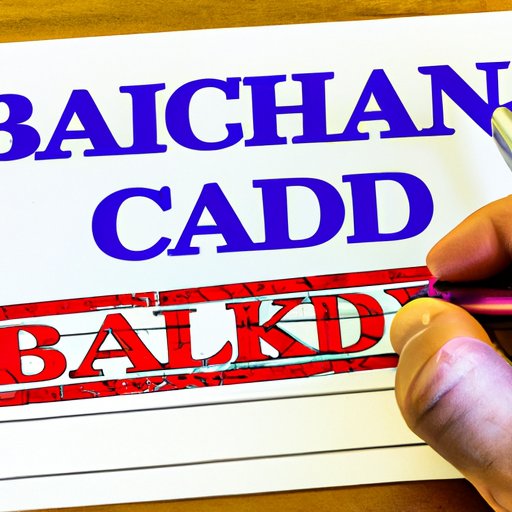Introduction
Writing a bad check is a legally punishable offense that can have serious consequences. When someone writes a bad check, it means that they are attempting to pay for something with a check that has insufficient funds in their account. This can be intentional or unintentional, and the legal consequences vary depending on the situation.
In this article, we will explore the definition of writing a bad check, the financial impacts, tips to avoid it, and the legal punishments for writing a bad check.
What Does it Mean When You Write a Bad Check?
Writing a bad check is when someone attempts to pay for something with a check that has insufficient funds in their account. It can be intentional or unintentional, but either way, it is considered a criminal offense and can lead to legal consequences.
The recipient of the bad check may contact the person who wrote the check, as well as the bank, in order to get the money owed to them. The person who wrote the check may be charged a fee by the bank for attempting to use a check with insufficient funds.
The financial implications of writing a bad check can also be severe. Depending on the amount of the check, the person who wrote it could be charged with a misdemeanor or even a felony.

How to Avoid Writing a Bad Check
There are several ways to avoid writing a bad check. First and foremost, it’s important to keep track of your finances and make sure you have enough money in your account to cover any checks you write. You should also double-check the information on the check before signing it, such as the date, amount, and recipient.
It’s also helpful to use a budgeting app or spreadsheet to stay on top of your finances. This can help you keep track of your spending and make sure that you always have enough money in your account to cover any checks you write.
Finally, if you find yourself in a situation where you need to write a check but don’t have enough money in your account, it’s important to contact the recipient and explain the situation. This can help prevent any legal action from being taken against you.
Examining the Legal Consequences of Writing a Bad Check
Writing a bad check can have serious legal consequences. Depending on the amount of the check, the person who wrote it could be charged with a misdemeanor or even a felony.
A misdemeanor charge for writing a bad check typically results in a fine and/or probation. A felony charge for writing a bad check is more serious and can result in jail time, restitution, and/or community service.
It’s important to note that some states have enacted laws that provide more lenient punishments for people who accidentally write bad checks. These laws are designed to provide an option for people who make an honest mistake and are not intentionally trying to defraud someone.
Conclusion
Writing a bad check is a legally punishable offense that can have serious consequences. In this article, we explored the definition of writing a bad check, the financial impacts, tips to avoid it, and the legal punishments for writing a bad check.
It’s important to remember that writing a bad check can have serious legal consequences, so it’s best to avoid it altogether. If you do find yourself in a situation where you need to write a check but don’t have enough money in your account, it’s important to contact the recipient and explain the situation.
By understanding the legal consequences of writing a bad check, you can take steps to avoid it and protect yourself from any potential legal action.
(Note: Is this article not meeting your expectations? Do you have knowledge or insights to share? Unlock new opportunities and expand your reach by joining our authors team. Click Registration to join us and share your expertise with our readers.)
